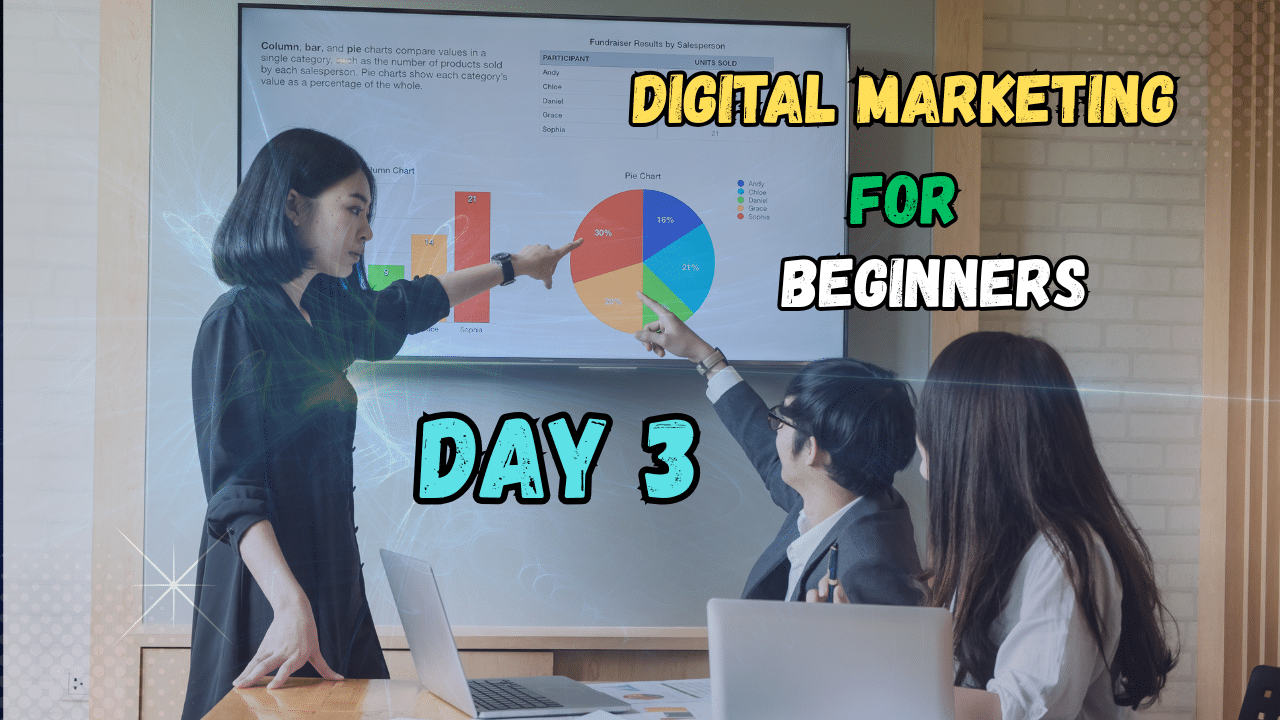Digital marketing for beginners day 3:
Getting Familiar with SEO (Search Engine Optimization) — The Magnet That Averages Free Traffic
Introduction
You are an aspiring student who has just begun a YouTube channel to review tech devices or career advice. You spend hours producing videos, but when you look at your views — it‘s hardly a few. You feel demotivated, believing, “My content‘s not up to the mark.” But here’s the thing: if I told you that the issue isn‘t your content, but visibility?
That‘s where SEO kicks in. It‘s the reason some videos or blogs show up first when you Google something and others remain unknown. SEO enables your content to be discovered without spending a single rupee on advertising.
What is SEO?

SEO refers to Search Engine Optimization a bunch of strategies that help your content appear higher on search engines such as Google.
Suppose you blog about “Top Productivity Apps for Students.” If you optimize it well for SEO, it will appear in the top results when someone puts that keyword in. So, free, organic traffic every day.
SEO is your best friend if you are a student, freelancer, or small business owner who wants to expand online without an expense.
Why Should You Care About SEO?
As per study, 93% of internet interactions start with a search engine.
If you’re publishing content, but nobody views it, it won‘t make a difference how great it is. SEO benefits:
- Bring in steady, long-term traffic
- Build trust and credibility
- Reduce your cost of marketing
- Establish your brand authority
Ads quit when you quit paying. SEO continues to work even as you sleep.
How Do Search Engines Like Google Work?
- Crawling: Spiders traverse web pages and gather information.
- Indexing: Gathered information is saved and indexed.
- Ranking: In accordance with relevance, quality, and intent, pages are ranked.
Google would like to give the user the best possible answer, and SEO enables you to deliver that answer in the appropriate format.
Three Pillars of SEO You Should Know
1. On-Page SEO
These are factors you have control over on your own page:
- Using targeted keywords
- Simple and memorable title tags
- Descriptive meta descriptions
- Organized headings (H1, H2, H3.)
- Good content that answers questions
- Swift and mobile-friendly layout
Tip: For a blog on “Healthy Breakfast Ideas,” applying keywords such as “quick breakfast for students“ makes it more discoverable.
2. Off-Page SEO
It entails having other websites link back to you (backlinks). It‘s receiving referrals.
You can establish backlinks by:
- Guest blogging on other websites
- Being mentioned on student websites or forums
- Developing shareable content such as infographics
3. Technical SEO
This is on the infrastructure of your website, such as:
- Quick load time
- Mobile-friendliness
- Secure (HTTPS) connection
- Clean URL structure
These make it easy for search engines to reach and index your site.
Keyword Research – The Backbone of SEO
Before creating content, know what your audience is looking for. Utilize these free tools:
- Ubersuggest
- Google Keyword Planner
- Google Trends
- AnswerThePublic
Search for a phrase such as “BTech student career tips” and consider the recommendations. Identify low-competition but high-interest keywords to include in your titles and content.
Examples of long-tail keywords such as “computer science internship tips” are less competitive and more targeted.
Real-Life Example: SEO in Action
Suppose that you are a student offering online sales of environmental stationery. You create a blog post entitled “Top 5 Recyclable Notebooks for Student Use.”
You:
- Incorporate keywords such as “best eco notebooks“
- Include high-quality pictures with alt text
- Link to other stationery-related articlesMake it responsive
Within a few weeks, your blog begins ranking and you start getting website traffic — and sales — without investing in ads.
That‘s the wonder of SEO!
Common SEO Mistakes to Avoid
- Keyword stuffing
- Duplicate or copied content
- Mobile optimization ignored
- Slow page speed
Google seeks content that truly assists users, not simply content attempting to “game the system.”
Free SEO Tools for Newbies
- Ubersuggest — Keyword research and competitor analysis
- Google Search Console — Keep an eye on performance, troubleshoot problems
- Google Analytics — Measure user activity
- Yoast SEO — Simple WordPress SEO optimization plugin
- AnswerThePublic — Find questions being searched
SEO is a Long-Term Game
Don‘t hope for overnight success. It takes time for search engines to trust new sites. But when it clicks, it generates passive traffic daily.
Similar to exam preparation, SEO pays off in consistency. Continue learning, optimizing, and freshening up your content.
Bonus: What is SEM (Search Engine Marketing)?
Up until now, we‘ve been talking about free traffic (SEO). But what if you need instant visibility?
That‘s where SEM — Search Engine Marketing comes in.
SEM is executing paid advertising on search engines such as Google. They appear first at the top of the searches when a person types in proper keywords.
SEM is paying rent to appear first, while SEO is buying a plot of land and constructing your house.
SEO vs SEM: Which One Is Best for You?
They both have their uses in digital marketing. Here‘s how to make your choice:
If you‘re brand-new, low on cash, and have the patience to develop your brand — begin with SEO. It‘s a long-term trust builder.
If you must have quick results (i.e., advertising an event, sale, or release), SEM gets you noticed immediately — at a cost.
An intelligent marketer leverages both, depending on the objective. You may begin with SEM for quick gains and develop SEO for sustained growth.
Want Youtube free tutorial
Final Thoughts
SEO is a skill that accumulates. The sooner you learn it, the more benefits you’ll reap later.
If you’re a student, freelancer, or would-be creator — learning SEO can unlock doors to employment opportunities, clients, and online revenue.
Coming up in Day 4 — we‘ll explore Social Media Marketing and how to build your brand on platforms such as Instagram, LinkedIn, and YouTube . Also check day 2 previous
Today‘s Action Step:
Use Ubersuggest or Google Trends and search 3 keywords in your niche. Write a basic blog post using one keyword and practice basic on-page SEO techniques!







